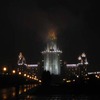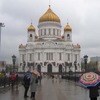G8 energy ministers gather in Moscow
Moscow: Exploration of fossil fuels and increasing global use of nuclear power will dominate talks in Moscow Thursday between the energy ministers of the G8 countries.
The ministers began arriving Wednesday for the consultations that will pave the way for the July summit of G8 leaders in St. Petersburg.
With Russia chairing the G8 for the first time this year, President Vladimir Putin has made energy security one of the three main agenda issues, together with education and infectious diseases.
The Moscow talks will examine plans for more effective use of nuclear energy and for resolving the energy deficiency in developing countries, government officials told Interfax news agency.
The G8 includes Russia, the US, Japan, Germany, Britain, France, Canada and Italy.
Representatives of China, India, Mexico, Brazil and South Africa were also invited to the Moscow meeting.
While the broader exploration of fossil fuel deposits was a focus, US Energy Secretary Samuel Bodman Wednesday said that countries should strive to reduce dependence on non-renewable energy sources.
Consequently, nuclear energy has gained new impetus in the quest to diversify.
The US aimed primarily toward the peaceful development of nuclear power, Bodman said.
Despite having the world's largest reserves of fossil fuels, Russia aims to increase the share of nuclear power in its consumption to 25 percent by 2020 by building 40 new reactors.
Japan has also shown interest in a Russian proposal to create a worldwide network for the provision of services in nuclear power generation.
According to Moscow's initiative, Russia will enrich uranium for use in reactors for countries like Iran to prevent them working alone and potentially developing nuclear weapons.
Russia has increasingly stressed its role as a reliable exporter of fossil fuel, in part to calm jitters among European customers over shortfalls in gas supplies suffered during the pricing row between Moscow and Kiev in January.
At a meeting in Brussels Tuesday, EU energy ministers called for greater energy cooperation with Russia under strategies for the next three decades.
The EU ministers also adopted a plan for reducing overall energy consumption by nine percent by 2017.
 Podium
Podium





